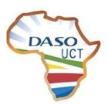DASO UCT RESPONSE TO THE RESOLUTION TAKEN BETWEEN COUNCIL AND THE “SRC Candidates/Shackville TRC and other student formations”.
2015 and 2016 has proven to be the years of radical and determined student activism from the #StatuesMustFall to the #FeesMustFallMovements. DASO UCT is resolute with the cause to bring free education for the poor, decolonised education and curricula, institutional transformation and social change at UCT.
DASO UCT stands united with the resilience of all students in our community and will continue to lead and be the voice of all students. It is with this regard that we highlight the following in terms of the stated resolution:
- DASO UCT condemns the constant reference by UCT management and protestors that their negotiations are with SRC Candidates, all 2017 candidates are not included in these negotiations and it is therefore a fallacy to project this image.
- DASO UCT notes with concern the lack of inclusivity with these negotiations and rejects the notion that all constituencies were represented.
1. Clemency and executive accountability:
DASO UCT recognises everyone’s right to protest as well as everyone’s responsibility to uphold the constitution. We therefore reject the convenient application of the constitution as well as UCT policy and rules. We must all be held accountable for our actions and student who have contravened any rule, policy or clause in the constitution beyond reasonable doubt must be held accountable for their actions. Any moratorium or amnesty and clemency sets a dangerous precedent that with enough protest and violence one's actions will be overlooked by UCT Management.
2. Institutional Reconciliation and Transformation Commission/ Shackville TRC:
DASO UCT welcomes the introduction if a Transformation Commission that will evaluate and make recommendations on institutional culture, transformation, decolonization, discrimination, disability and all other issues raised over the past 18 months. We are further in support of ensuring that commission hearings are open to all students across the campus and that all members of the UCT community will be able to make submissions.
3. Coherent policy on funding higher education and advocacy for free decolonized education:
DASO UCT is resolute with the struggle to ensuring a comprehensive student funding model and to ensure that all qualifying students have access to tertiary education. It is with this effort that we have presented a clear funding model which creates free education for poor students and comprehensive subsidisation for the ‘missing middle’. We are clear that government and the DHET must reprioritize the fiscus to accommodate all academically deserving students. We also call on the University of Cape Town Management to reconsider their budget and to evaluate how they can further accommodate students to enter the institution making clear and pragmatic recommendations to the UCT community.
We support the decolonization of the university’s institutional culture and curricula and are clear that this is a need and not a suggestion that UCT Management must not consider but must show implementation in the coming academic year.
4. Financial exclusions and fee blocks:
DASO UCT welcomes the efforts by management to seek more institutional funding for students. We support efforts to assist students who are on financial aid and eligible to progress and graduate regardless of unaffordability. As DASO UCT we will closely monitor this as we firmly believe no student should be economically discriminated against, thus breaking the stigma that a UCT degree is merely bought and not earned.
5. Completion of the 2016 academic year:
DASO UCT is committed to completing the 2016 academic year in an open and safe University of Cape Town. While we welcome efforts to assist in ensuring a successful completion to the academic year, we condemn all movements that have so violently removed student’s constitutional right to education. We also condemn management’s lacklustre efforts to ensure that our right to education in and open and safe university is ensured. We call on UCT management to ensure the safety of students during the examination period.
6. The use of private security in managing protests:
Chapter 2, section 17 of the Constitution is clear that “Everyone has the right, peacefully and unarmed, to assemble, to demonstrate, to picket and to present petitions.” The Constitution furthermore states in Chapter 2, section 12, subsection 1c that everyone has the right “to be free from all forms of violence from either public or private sources.” DASO UCT therefore calls on UCT Management to ensure the safety of all members of the campus community and calls on management to ensure that all security sources conduct themselves in a professional and appropriate manner. We condemn all forms of police brutality and that of private security, anyone engaging in criminal activity should be restrained appropriately and in line with the constitution.
DASO UCT will continue to fight for all students and especially those financially marginalised. We will continue to hold the Department of Higher Education and Training, Finance and the Presidency accountable to ensure all academically deserving students are able to enter tertiary education institutions. As the youth and students of 2016 we believe that our struggle is not one that new, but one that is being continued by those who came before use, we are claiming the promises of 1994. Education shouldn’t be a debt sentence, shoot down fees not students.
Statement issued by Carl Pophaim, DASO UCT Branch Leader, 7 November 2016

